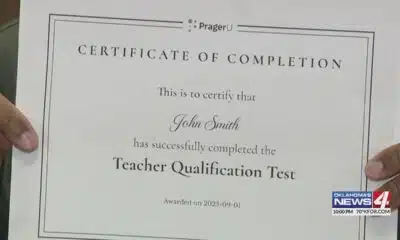News from the South - Louisiana News Feed
Louisiana auto insurance debate overheats as legislation nears finish line
Louisiana auto insurance debate overheats as legislation nears finish line
by Wesley Muller, Louisiana Illuminator
May 23, 2025
Tensions are escalating at the State Capitol as a legislative package that attempts to lower auto insurance costs in Louisiana nears its final stage of approval.
On Wednesday, the Senate advanced six of the more controversial insurance measures in a floor session that lasted late into the night. The debate included impassioned floor speeches and a heated clash between two lawmakers, both attorneys who stand on opposite sides of the issue.
Gov. Jeff Landry has signaled support for the proposals.
Only one of the bills cleared the chamber with bipartisan support, while the other five passed mostly along party lines with Republicans voting in favor of them and Democrats against. Those five are so-called “tort reform” proposals that give insurance companies certain protections or advantages in litigation, making it harder for accident victims to file successful lawsuits.
Tort reform legislation from previous years has failed to reduce auto insurance rates, though most Republicans, including state Insurance Commissioner Tim Temple, have said those measures were not strong enough.
This lack of results was among the points of contention during Wednesday’s debate on Senate Bill 231, which took up most of the evening before the bill passed in a 27-8 vote. Sponsored by Sen. Mike Reese, R-Leesville, it would effectively reduce the money plaintiffs can recover for medical expenses in an auto accident lawsuit. The amount would be limited to what a plaintiff actually pays for care rather than what doctors and hospitals bill.
Supporters of Reese’s bill argue it would provide medical billing transparency in personal injury lawsuits and prevent plaintiffs’ attorneys from basing claims on artificially inflated medical bills no one actually pays.
Opponents argue transparency should apply to both sides. They pointed to a separate tort reform law that allows insurers to hide certain details related to their policyholder’s coverage during a trial. Jurors could lower a monetary award if they believe an individual defendant — rather than an insurance company — will be personally on the hook for paying it, according to their viewpoint.
“Current law allows the plaintiff to lie to the jury, and it does not allow the defendant to tell the truth,” Sen. Alan Seabaugh, R-Shreveport, an attorney whose practice includes insurance defense, said in support of the measure.
Sen. Jay Luneau, D-Alexandria, took issue over what he called Seabaugh’s “ambush-type” strategy to tack on a late-hour amendment to Reese’s bill that other senators had no time to review.
Luneau, a personal injury lawyer, said the amended bill was being rushed because Seabaugh had a conflicting court date Tuesday, when the Senate convenes next after a long Memorial Day holiday.
Standing at the Senate floor lectern within a foot of each other, Luneau and Seabaugh got into an exchange that quickly grew intense.
Seabaugh said the amendment, which was eventually adopted, requires judges and juries to be shown both the amount paid and the amount billed for medical expenses in auto injury cases, but confusion ensued over its text. The Republican senator, defending his amendment, said that Luneau, himself, had requested the provision.
When Luneau denied this and offered to withdraw the purported request, Seabaugh, in a raised voice, accused Luneau of lying.
“You were pounding the table, saying ‘Let’s tell the jury everything. Let’s let them see the billed amount,’” Seabaugh said, pausing but drawing no response from Luneau. “You are just gonna come up here and blatantly bald-faced lie, and I’m not surprised.”
The accusation drew quick intervention from Senate President Cameron Henry, R-Metairie, and prompted Senate Sergeant-at-Arms Louis Carral Jr. to swiftly approach the lectern, prepared to physically separate the two men.
“Whoa, whoa, whoa, whoa, whoa, whoa, whoa, whoa! Guys, guys, come on!” Henry told the two senators. “There’s a certain amount of decorum that we expect to have in the Senate. Y’all need to relax.”
The amendment actually would have allowed defendants to try to lower jury awards following a trial
Later, Luneau delivered a lengthy speech against the bill, so long that he appeared to be mounting a filibuster to delay a vote. But he ultimately ceded the floor after detailing his comprehensive argument against tort reform.
Luneau cited data from the Louisiana Department of Insurance that shows there are more than 100 auto insurance companies in Louisiana, countering arguments that more insurers are needed in the state to create competition. Overall, they received $5.9 billion in premiums and paid out $3.4 billion in claims and losses, the date shows.
The five largest auto insurers in the state — State Farm, Progressive, Geico, Allstate and GoAuto — control 70% of the market, according to state data Luneau shared.
“This is a bad bill,” Luneau said. “It’s going to take money away from people who are legitimately injured, and it’s not going to reduce automobile insurance rates. And we’ll be right back here again with people screaming about the next round of tort reform we need to do.”
Reese’s bill next heads to the House for consideration.
Rate history disclosure
Only one of the five proposals, House Bill 148, sponsored by Rep. Jeff Wiley, R-Maurepas, received bipartisan support. Republicans counted for all of the no votes in the 26-9 outcome.
Wiley’s proposal would require homeowner and auto insurance companies to show customers what they paid previously for coverage when sending out renewal notices. It would let customers see whether their rates have changed before they decide to extend their policy.
The bill would also give the state insurance commissioner power to strike down any insurance rate increase considered “excessive” or unreasonably high. Temple has lobbied against this provision, arguing it would force him to choose between rates based on real market conditions and the perception that he’s lowering rates to improve his reelection chances.
Senate Republicans weakened the provision Wednesday when they inserted language into Wiley’s bill that could let Temple approve excessively high rates as long as an insurer shows that they weren’t chosen arbitrarily or randomly.
Gov. Landry’s approach to lower insurance rates could cast his political fate
Another amendment to Wiley’s bill allows the public to review documents insurance companies file with the state when seeking a rate increase, but only if the insurance commissioner determines the information shouldn’t be kept confidential as a proprietary trade secret.
The measure will return to the House for a final vote on amendments before heading to the governor’s desk.
Other insurance legislation the Senate approved included:
House Bill 450, by Rep. Michael Melerine, R-Shreveport, would end the Housley presumption, a standard of evidence explained in a 1991 Louisiana Supreme Court ruling that applies to auto accidents, medical malpractice and other injury lawsuits. In a nutshell, the Housley presumption says courts should assume a plaintiff’s injuries resulted from the accident in question if they were in good health beforehand.
The bill received final approval in a 28-9 vote and awaits Gov. Landry’s signature.
House Bill 434, sponsored by Rep. Jason DeWitt, R-Alexandria, would limit bodily injury claims by plaintiffs who did not carry auto insurance at the time of the accident. It would forbid them from recovering as much as $100,000 worth of damages.
The bill received final approval in a 28-9 vote and has been sent to the governor.
House Bill 431, sponsored by Rep. Emily Chenevert, R-Baton Rouge, would change Louisiana’s comparative fault statute, which assigns a percentage of blame to each party in an accident and allows for the recovery of damages in proportion with those percentages.
Proponents argue comparative fault allows someone to recover damages for injuries sustained in accidents for which they are mostly at fault. Opponents say it is the fairest way to assign liability.
Under current law, if a court finds one party in a lawsuit is 60% at fault for an accident and the other party is 40% at fault, they would each be liable for their respective share of the damages and could file claims against each other for the remaining amounts. Under Chenevert’s bill, anyone who is 51% or more at fault for an accident would get nothing.
The bill passed in a 28-9 vote and will return to the House for changes made in the Senate.
House Bill 436, by Rep. Gabe Firment, R-Pollock, would prohibit “unauthorized aliens” — defined in the measure as individuals illegally in the United States under federal immigration law — who are injured in car accidents from receiving compensation for pain, suffering and lost income. The proposal would still allow recovery for property damages and medical expenses. Auto insurance companies could still sell policies to unauthorized immigrants.
It cleared the chamber in a 27-10 vote and will return to the House for a vote on Senate amendments.
GET THE MORNING HEADLINES.
Louisiana Illuminator is part of States Newsroom, a nonprofit news network supported by grants and a coalition of donors as a 501c(3) public charity. Louisiana Illuminator maintains editorial independence. Contact Editor Greg LaRose for questions: info@lailluminator.com.
The post Louisiana auto insurance debate overheats as legislation nears finish line appeared first on lailluminator.com
Note: The following A.I. based commentary is not part of the original article, reproduced above, but is offered in the hopes that it will promote greater media literacy and critical thinking, by making any potential bias more visible to the reader –Staff Editor.
Political Bias Rating: Center-Right
This article presents a detailed account of the Louisiana legislative process regarding auto insurance tort reform, highlighting the Republican-backed bills that favor insurance companies by limiting plaintiffs’ recoveries. The framing largely reflects a conservative, pro-business perspective through emphasis on tort reform and insurance industry interests, supported by Republican lawmakers and Gov. Jeff Landry. However, it also fairly presents Democratic opposition and arguments against the bills, including concerns about limiting injured plaintiffs’ rights and the ineffectiveness of prior reforms. The balanced presentation of both sides suggests reporting that leans moderately toward conservative viewpoints without ignoring opposing perspectives.
News from the South - Louisiana News Feed
Lafayette prosecutor Gary Haynes’ federal bribery trial starts
SUMMARY: Gary Haynes, longtime Lafayette Assistant District Attorney, faces federal trial Monday on bribery, kickback, money laundering, and obstruction charges linked to the 15th Judicial District Attorney’s Office pretrial intervention program. Indicted in September, Haynes allegedly steered participants to a vendor in exchange for bribes, including an $81,000 truck. Co-conspirators, all pleading guilty, are expected to testify against him. Evidence includes wiretaps and consensual recordings. Haynes remains on unpaid administrative leave amid scrutiny for rehiring him after a decade-old bribery scandal shuttered the office. The trial poses significant reputational and legal consequences, with Haynes facing up to 60 years if convicted.
The post Lafayette prosecutor Gary Haynes’ federal bribery trial starts appeared first on thecurrentla.com
News from the South - Louisiana News Feed
NBC 10 News Today: LSU female drum major
SUMMARY: The LSU Golden Band from Tigerland is gearing up for an exciting season, highlighted by senior Catherine Mansfield as only the fourth female drum major in the band’s history. With 325 members, the talented group has spent countless hours perfecting their performance, emphasizing precision, passion, and flawless execution. Mansfield feels the pressure but feeds off fan excitement, while Drum Captain Brayden Ibert praises the youthful, skilled group. Associate Director Simon Holoweiko underscores the dedication behind every drill, footwork, and horn note, ensuring the band delivers a powerful, high-energy show that electrifies game day experiences for LSU fans.
The LSU Tiger Band is gearing up for the 2025 season premiere, marking a historic moment as senior drum major Catherine …
News from the South - Louisiana News Feed
Clay Higgins continues his atypical quest for political relevance
by Greg LaRose, Louisiana Illuminator
September 7, 2025
For at least a moment earlier this year, U.S. Rep. Clay Higgins was willing to depart from his typical far-right, far-fetched stances to take a position most would label liberal – on a criminal justice matter, of all things.
Yet just months later, the Lafayette Republican is back to his extremist ways. What’s different now is that he appears rudderless, permanently veering to the right to the point where it could be argued he’s merely spinning in political circles.
Heads turned during the spring session of the Louisiana Legislature when Higgins, a former policeman, gave his support to a proposal that would have let people put in Louisiana prisons by non-unanimous juries seek reviews of their cases. The lawman-turned-lawmaker urged the “swift passage” of the bill by state Sen. Royce Duplessis, D-New Orleans, arguing it preserved the U.S. Constitution’s rights to due process and a fair trial.
“You could not have told me in my 42 years on this earth that I would have a letter from Congressman Clay Higgins supporting a bill that I brought,” Duplessis told colleagues on the Senate floor before they resoundingly rejected the measure. Opponents in the Republican supermajority said the policy change would overload prosecutors and court staff.
In recent days, Higgins has come out firing on all cylinders but with no clear direction ascertainable.
On Aug. 29, he sent a letter to House Speaker Mike Johnson saying that he was stepping down from the House Homeland Security Committee after Rep. Andrew Garabino, R-N.Y., was named its new chairman. Higgins, a candidate for the post, appeared dejected after the vote.
“My Republican colleagues have chosen an alternate path for the Committee that I helped to build,” he wrote to Johnson, “a path more in alignment with the less conservative factions of our Conference, factions whose core principles are quite variant from my own conservative perspective on key issues like amnesty, ICE operations, and opposition to the surveillance state.”
That’s the Higgins we’ve come to know – bitter, self-righteous and steered by conspiracy theories. As he still sits on the House Armed Services and the Oversight and Government Reform committees (chairing the latter’s law enforcement subcommittee), there will be ample chances for him to make bluster’s last stand.
And by no means will Higgins limit himself to those matters. A week ago, he urged the House Appropriations Subcommittee on Labor, Health and Human Services to withhold federal funding from “organizations that push COVID vaccines on young children.”
It followed his pledge on social media to “defund” the New Orleans Health Department for promoting the American Academy of Pediatrics’ guidance on COVID-19 vaccines for children from 6 months to 2 years old.
“State sponsored weakening of the citizenry, absolute injury to our children and calculated decline of fertility,” Higgins wrote in an Aug. 20 X post.
Call me a skeptic, but if there’s a group out there that’s least likely to be anti-fertility, it’s probably pediatricians. It’s not good for their business model.
YOU MAKE OUR WORK POSSIBLE.
Higgins’ latest play for political relevance came Thursday when he joined forces with Rep. James Comer, R-Ky., Oversight and Government Reform chairman, to investigate allegations that pharmacy chain CVS Health used “confidential patient information” to lobby the Louisiana Legislature.
Caremark, a CVS subsidiary, is the prescription benefit manager for the health insurance plan that covers state employees in Louisiana. Attorney General Liz Murrill is suing the company, saying it used information gained through that contract to send text messages to state employees asking them to oppose proposed legislation. The bill in question would have prohibited prescription benefit managers from co-owning pharmacies. Ultimately, lawmakers opted for a less aggressive, transparency measure with the support of independent pharmacies.
Critics consider the co-ownership arrangement self-serving, as the management entities have a direct say in how their affiliated pharmacies price – and profit from – prescription drugs.
Comer and Higgins have requested CVS Health president and CEO David Joyner provide a slate of records to aid in their investigation.
David Whitrap, who handles external relations for CVS, said in an email the company plans to respond to Comer and Higgins. With regards to the text messages, its communication with customers, patients and the community “was consistent with the law,” he said.
As much as he wants to position himself to the far right, Higgins’ involvement in accountability efforts such as this makes him a centrist – at least on this issue. The battle against pharmacy benefit managers is a bipartisan one, with both sides looking to claim the win for bringing down prescription drug and health insurance costs.
Regardless, it’s a welcome moment of lucidity from Higgins, much like Rep. Marjorie Taylor Greene’s demand for the U.S. Department of Justice to produce all its files on Jeffrey Epstein.
No one expects it, but it’s certainly welcomed.
For Higgins, more frequent stances like this could help him emerge from the shadow of Louisiana’s more prominent Republicans in the House – Speaker Johnson, Majority Leader Steve Scalise and Rep. Julia Letlow, a member of the powerful House Appropriations Committee.
But if history portends what lies ahead from Higgins, expect him to once again find his comfort zone on the fringes.
Louisiana Illuminator is part of States Newsroom, a nonprofit news network supported by grants and a coalition of donors as a 501c(3) public charity. Louisiana Illuminator maintains editorial independence. Contact Editor Greg LaRose for questions: info@lailluminator.com.
The post Clay Higgins continues his atypical quest for political relevance appeared first on lailluminator.com
Note: The following A.I. based commentary is not part of the original article, reproduced above, but is offered in the hopes that it will promote greater media literacy and critical thinking, by making any potential bias more visible to the reader –Staff Editor.
Political Bias Rating: Center-Left
The content critiques U.S. Rep. Clay Higgins from a perspective that highlights his far-right positions and labels some of his views as extremist, while also acknowledging occasional bipartisan or centrist actions. The tone is skeptical of conservative stances, particularly on issues like criminal justice, immigration, and COVID-19 vaccines, and it uses language that suggests disapproval of right-wing conspiracy theories. However, it also recognizes moments when Higgins aligns with more moderate or bipartisan efforts, indicating a nuanced but generally center-left leaning viewpoint.
-
Mississippi Today6 days ago
Trump proposed getting rid of FEMA, but his review council seems focused on reforming the agency
-
News from the South - Missouri News Feed7 days ago
Missouri joins dozens of states in eliminating ‘luxury’ tax on diapers, period products
-
News from the South - Tennessee News Feed6 days ago
Tennessee ranks near the top for ICE arrests
-
News from the South - Texas News Feed4 days ago
Texas high school football scores for Thursday, Sept. 4
-
Mississippi Today5 days ago
Brandon residents want answers, guarantees about data center
-
News from the South - Oklahoma News Feed6 days ago
Test taker finds it's impossible to fail 'woke' teacher assessment
-
The Conversation6 days ago
What is AI slop? A technologist explains this new and largely unwelcome form of online content
-
News from the South - Arkansas News Feed6 days ago
Every fall there’s a government shutdown warning. This time it could happen.








































